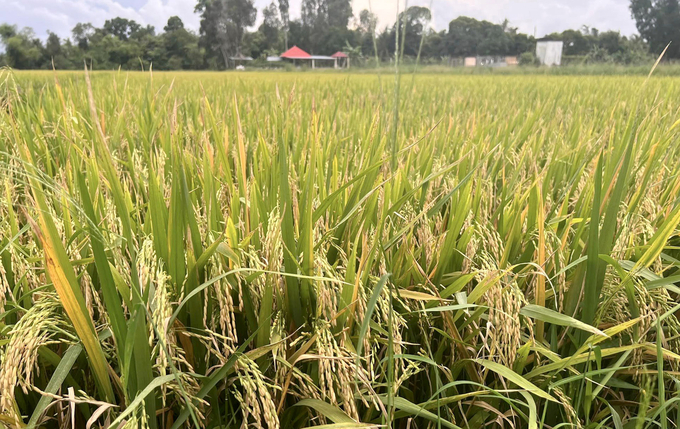May 30, 2025 | 02:32 GMT +7
May 30, 2025 | 02:32 GMT +7
Hotline: 0913.378.918
May 30, 2025 | 02:32 GMT +7
Hotline: 0913.378.918

Farmers in Mekong Delta harvesting rice. Photo: Son Trang.
According to the Vietnamese Trade Office in the Philippines, data from the Philippine Department of Agriculture's Rice Import Licensing Authority shows that as of the end of October 2024, the Philippines imported a total of 3.68 million tons of rice. This figure is significantly higher than the 2.84 million tons imported during the same period in 2023 and surpasses the total rice imports for all of 2023.
In recent months, the volume of rice imported into the Philippines has remained high. In August and September, imports reached around 400,000 tons per month. In the first 24 days of October, 381,000 tons were imported, indicating continued strong demand.
Sources in the Philippines indicate that traders and importers have been more active in securing rice, with a sharp increase in applications for Sanitary and Phytosanitary Import Clearance (SPSIC). In September, the Bureau of Plant Industry (BPI) in the Philippines issued 1,132 SPSICs for a volume of 886,000 tons of rice. In just the first three days of October, BPI issued 204 SPSICs for 163,000 tons.
The Vietnamese Trade Office in the Philippines projects that demand for rice imports will remain high in the coming months, driven by increased domestic consumption and crop damage from natural disasters. Total rice imports by the Philippines for 2024 are expected to exceed 4 million tons, potentially reaching 4.5 million tons.

Ripe rice in Mekong Delta. Photo: Son Trang.
Vietnam continues to hold a dominant position in rice exports to the Philippines, with a significant market share. By the end of October 2024, the Philippines imported 2.91 million tons of rice from Vietnam, accounting for over 79% of its total imports of 3.68 million tons. Thailand ranks second with 458,000 tons (12.4%), followed by Pakistan with 162,000 tons (4.5%), Myanmar with 115,000 tons, and India with 22,000 tons.
Vietnamese rice's market share in the Philippines in the first 10 months of this year is nearly on par with 2023. According to the BPI, in 2023, the Philippines imported 3.57 million tons of rice, with Vietnamese rice making up 83%.
Earlier this year, concerns arose about Vietnam losing market share in the Philippines due to competition from Thailand and other Asian countries. Between early 2024 and March 7, Vietnamese rice comprised only 54% of total imports, while Thailand held 27% and Pakistan 13%.
In the early months of the year, Vietnam's rice supply was limited, and the Philippine government sought to diversify its sources to reduce dependence on Vietnamese rice, leading to a sharp drop in Vietnam's market share.
However, as Vietnam increased its rice supply from the winter-spring, summer-autumn, and autumn-winter harvests, its market share in the Philippines quickly rebounded. In the first half of the year, Vietnamese rice accounted for 74% of Philippine imports, and by the end of October, it had risen to 80%. After the sharp decline at the beginning of the year, Vietnamese rice has gradually regained its market share in the Philippines.
The Philippines remains Vietnam's largest rice export market. According to Vietnam’s General Department of Customs, in the first nine months of this year, rice exports to the Philippines reached nearly 3.22 million tons, valued at nearly USD1.98 billion—a 32% increase in volume and a 53.3% rise in value compared to the same period in 2023. The Philippines accounted for 45% of Vietnam’s total rice exports in the first nine months.
The Vietnamese Trade Office in the Philippines reported that rice represents the largest export value item in trade between Vietnam and the Philippines, accounting for 43% of total Vietnamese exports to the Philippine market in the first nine months of 2024. In rice trade between the two countries, only Vietnamese rice is exported to the Philippines, with no reciprocal trade. As a result, rice comprises a substantial portion of the more than USD3 billion trade surplus Vietnam achieved with the Philippines in the first nine months of this year.
Translated by Linh Linh

(VAN) Ms. Nguyen Thi Dung, Deputy Director of Ngoc Hoang Cooperative, shared about the journey of bringing dragon fruit to Europe, achieving annual revenues in the billions of VND.

(VAN) Bamboo products from Thang Tho Bamboo Cooperative have reached many countries around the world, while also creating jobs for local workers.

(VAN) The Management Board of Con Dao National Park reported that a green sea turtle, tagged in the Philippines, has traveled thousands of kilometers to lay 84 eggs on Bay Canh Islet.

(VAN) Green technology is paving a new path for sustainable aquaculture in the Mekong Delta in particular and across the country in general, helping reduce emissions and adapt to climate change.

(VAN) On May 27, La French Tech Vietnam (the French startup and innovation community in Vietnam) held the French Tech Summit Vietnam 2025.
/2025/05/27/4731-2-223159_980.jpg)
(VAN) No votive paper, no styrofoam, no plastic bags, no plastic bottles, and no single-use plastic trays are the key rules tourists should keep in mind when visiting Con Dao.

(VAN) In the fight against plastic pollution, Vietnam has been demonstrating a proactive, pioneering, and active role in addressing the greatest environmental challenge today.